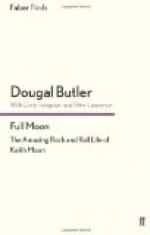“Charlie Turold—my nephew, you know—will have it that she is innocent.”
“In spite of her disappearance?”
“Yes. He came this morning, before I was up, to see if I knew where Sisily had gone. After tea he came again in a terrible state, raving against the detective for taking out a warrant for her arrest. He said it was madness on his part to imagine that a girl like Sisily would kill her father. I told him that as Sisily had disappeared he could hardly blame the police for looking for her. He turned on me when I said that, and used such violent language that I was quite frightened of him. But I make allowances, of course.”
“Why?” the lawyer asked, looking at her.
“I think Charlie is very fond of Sisily,” murmured Mrs. Pendleton with womanly intuition.
“Do you mean that they love each other?” said the lawyer, regarding her attentively.
“I cannot say about Sisily. And I never guessed it of Charlie until this morning. I’m sure poor Robert had no idea of it. He would never have agreed—after what he told us on the day of the funeral, I mean.”
Mr. Brimsdown gave a tacit unspoken assent to that. Some men might have welcomed such a solution of an ugly family scandal, but not Robert Turold, with his fierce pride for the honour of the title which he had sought to gain.
“Is your nephew’s belief in Miss Turold’s innocence based on anything stronger than assertion? Does he suspect any one else?”
“He did not say so. He was very excited, and talked on and on, without listening to me in the least. He seems very impulsive and headstrong. I noticed that on the day of the funeral. When Robert told us about his marriage, Charles said to him that his first duty was to his daughter. Robert looked so angry.”
“I can well believe it,” murmured the lawyer. “The young man must have courage.”
“Oh yes, he served with distinction in the war,” Mrs. Pendleton innocently rejoined. “In temperament he takes after me, I think, more than after his father. Austin and I never did think alike. We even disagreed over poor Robert’s terrible death. Austin thought he had ... destroyed himself.” Her voice dropped to a shocked whisper.
“On what grounds did he base that belief?” Mr. Brimsdown cautiously asked.
“He thought the circumstances pointed to it,” she rejoined. “But I knew better—I knew Robert would never do anything so dreadful. Besides, had I not seen that horrible old man-servant glaring through the door? That is why I went to the police.”
As Mrs. Pendleton showed a tendency to repeat herself, Mr. Brimsdown rose to terminate the interview. Mrs. Pendleton rose, too, but she had not yet reached the end of her surprises for him.
“And then there’s Robert’s will—so strange! Really—”
“The will! What will?” interrupted the lawyer testily. “Did your brother make his will down here?”




